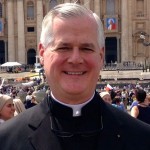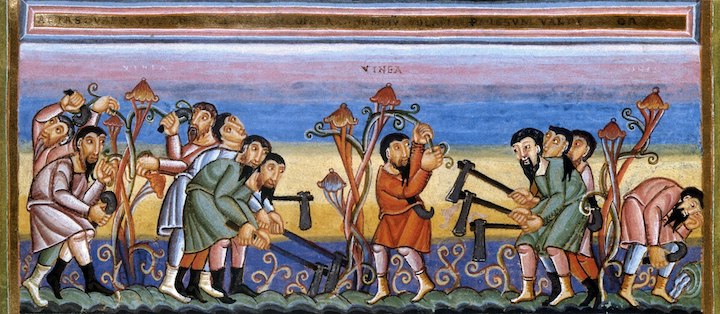
Fr. Gerald E. Murray
The Rev. Gerald E. Murray, J.C.D. is a canon lawyer and the pastor of Holy Family Church in New York City. His new book (with Diane Montagna), Calming the Storm: Navigating the Crises Facing the Catholic Church and Society, is now available.
The worsening crisis in the Catholic Church is the product of bold, unapologetic doctrinal infidelity spearheaded by influential churchmen and women who calmly operate without the least sign of papal disapproval. In fact, many of them are favored and promoted by Pope Francis. They argue that various Catholic teachings stand in need of improvement, remediation, and refashioning. They call for the use of less “offensive” and more “inclusive” words. They mislabel this attempted destruction of Catholic doctrine as nothing more than classical “doctrinal development,” under the banner of a new, Holy Spirit-inspired synodal style. They are trying to overthrow Church teaching while assuring us that they have no such intention. They simply want, they say, to remedy “insufficiencies” in that teaching.
It feels as though we have been thrown back into the maelstrom of the late 1960s upheaval in the Church, only this time the pope is not rebuking the men and women promoting error, as did Paul VI, but rather appointing those very people to influential roles where they will single-mindedly pursue their objectives, confident that they will receive papal support.
Pope St. John Paul II and Pope Benedict XVI have been cordoned off from consideration as normative, as if the papal magisterium from 1978 to 2005 has been placed in a hermetically sealed container, to be treated as a kind of viral threat to arrival at the destination to which “the Spirit is leading the Church today.”
Outspoken and authoritative opponents of doctrinal infidelity are absent from the upcoming Synod on Synodality, except for Gerhard Cardinal Mueller. Further, in a month-long meeting of around 400 delegates, the speeches will be largely a sideshow. The synodal leadership and their chosen experts will steer the proceedings in the desired direction and produce written propositions that will not disappoint those who believe that Cardinal Mueller is wrong on most things.
Dietrich von Hildebrand published The Devastated Vineyard in 1973, a pointed analysis of the troubled state of the Church fifty years ago. He asked, “How should we respond in the present situation when the vineyard of the Lord is devastated?” His response is instructive: “[I]t would be thoroughly false to say: since God allows it, it must be according to His will, and so we have nothing to do but say, ‘Thy will be done,’ even if this devastation breaks our heart.”
Hildebrand continued:
As St. Paul says, God allows these evils in order to test us. But it is a deadly and radically false notion to think that, because God allows heresies to be readily spread, we should not fight against them but should go along with them in a spirit of resignation. This is a false interpretation of resignation to God’s will. The devastation of the vineyard of the Lord should instead fill us with the deepest pain, and mobilize us for the fight, to be fought with all legitimate means, against everything which is evil and offensive to God, against all heresies.

And he reminds us that our time has a parallel in past Church history: “We have to realize that our time is like the time of Arianism, and so we have to be extremely careful lest we be poisoned ourselves without noticing it. We must not underestimate the power of those ideas which fill the intellectual atmosphere of the time, nor the danger of being infected by them when we are daily breathing this atmosphere. Nor should we underestimate the danger of getting used to the evils of the times, and them becoming insensitive to them. . .”
Hildebrand’s salutary advice is sobering yet hopeful as we prepare ourselves for the inevitable strife occasioned by the present crisis of faith, soon to be on full display at the October Synodal Assembly:
But today these [bad] trends are able to develop within the Church. We can clearly discern them in sermons, in pastoral letters and in books by well-known theologians. Since these bad trends encounter so little resistance within the Church, it has become much more difficult for the simple faithful to grasp their incompatibility with the deposit of faith. . . .today we have to develop in ourselves a special awareness, a holy mistrust, for we not only live in a poisoned world, but in a devastated Church. In our present trial God requires of us this watchfulness, this holy fear of being infected. It would be a lack of humility to think we are in no danger of being infected. It would be a false security rooted in pride if we were to think that we are immune. Each of us must become aware of his frailty, and understand that special watchfulness is required of us by God in the trial we are going through.
So we see that God expects us, in the present devastation of His vineyard, to respond first of all by growing in faith, hope, and love; secondly, by being especially watchful lest we be infected in any way; thirdly, by struggling against the devastation with all the means at our disposal; and fourthly, by not forgetting that the absolute truth of the deposit of the Catholic Faith objectively remains untouched by all the empty talk of certain theologians.
We must never forget that in spite of all the diabolic devastation of the vineyard of the Lord, the glory of the holy Church, the bride of Christ, and the glory of all saints nevertheless remains untouched in its reality, indeed it is the one true reality. What do all the changing trends of the time really amount to? They are so much “sound and fury, signifying nothing” when compared with the eternal truth and the objective glory of Jesus Christ, with the holiness of the saints which glorifies God.